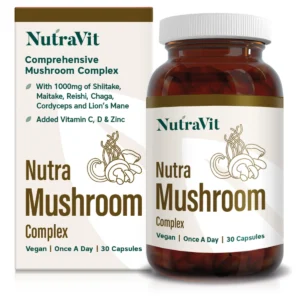Nutritionists and dietitians agree – mushrooms are a superfood containing vital vitamins and minerals, as well as antioxidants. They’re also the only natural plant source of vitamin D. As such, they definitely deserve to be in our diets, especially since they taste so good as well.
We don’t always have the time though to shop for mushrooms or even cook them, and that’s where our new vitamin supplement NutraMushroom comes in to play. Packed full of goodness from six different types of mushroom (there are around 2000 edible varieties in the world), they can help booster your body’s defences to remain healthy and in fighting condition.
The six different mushroom types we’ve chosen to include in our new NutraMushroom formula are: Shiitake, Maitake, Reishi, Chaga, Cordyceps and Lion’s Mane. Here we explain the special health-giving properties of each individually:
Shiitake
Containing similar amino acids as meat, Shiitake mushrooms are high in copper and vitamin B5. They’ve been used to support the heart, tackle cancer and boost the immune system, particularly in Japan where the majority of the mushroom grow. This is believed to be down to the fact they contain terpenoids, sterols, polysaccharides and lipids.
One 2015 study showed how to dried shiitake mushrooms every day for one month can improve the immune system and lower inflammation in humans.
Maitake
The Japanese refer to it as the ‘dancing mushroom’ (because people would ‘dance with joy’ on discovering it), but Maitake is said to have many health-giving properties too. In the main though it’s an adaptogen. This means it can help reduce stress and combat fatigue.
The mushroom is also believed to have anti-cancer properties and many studies have shown it can have a positive effect on blood sugar. Mushrooms also contain unsaturated fatty acids, alkaloids and polysaccharides – all of which helps regulate insulin and glucose in the body.
Reishi
This mushroom (also known as Lingzhi) has a reputation as an immune-booster, in particular. That’s because test-tube studies have shown it can positively affect white blood. It has been found to do this by altering inflammation pathways, and by multiplying the white cell count. It’s this ability to produce more white cells that gives the mushroom its potential cancer fighting abilities. See this 2018 study on prostate cancer and Reishi.

Chaga
Another mushroom with enhanced immune-boosting properties, Chaga is packed full of antioxidants and works particularly well in herbal tea form. The mushroom actually grows on the bark of birch trees in cold climates, such as Siberia and looks like a chunk of charcoal, hence it’s nickname ‘black mass.’
Studies show Chaga can stimulate the white blood cells necessary to fight off viruses and infection. Impressively, a test tube study showed it prevented the growth of liver cancer. This is believed to be partly down to a high concentration of the antioxidant triterpene.
Cordyceps
A fungus that actually grows on the back of larvae, cordyceps has 700 different variations, but only two of those are of interest to the scientific community – sinensis and militaris. These are used to boost energy supply to the muscles, and which is why it’s much loved by athletes. This 2024 Taiwanese study shows it can result in a quicker recovery after exercise, as well as limiting muscle tears.
Test tube studies have also shown that Cordyceps can limit cancer cell growth. Cordyceps CS-4 is used by hospitals in China.
Lion’s Mane
Deriving the name from their large while and shaggy appearance, Lion’s Mane mushrooms are said to have a ‘seafood’ taste.
In terms of health benefits, they are believed to be especially good for the brain, heart, and gut. They are said to have two compounds – hericenones and erinacines – which can stimulate the brain cells to grow. That’s according to a 2019 study by the University of Malaysia. A Chinese study, this time in 2020 and on Alzheimer’s patients, showed that a daily gram of lion’s mane for 49 weeks, improved cognitive test scores.
The anti-inflammatory effects of Lion’s Mane mushroom are believed to help reduce feelings of anxiety and even depression. Lion’s Mane is also used to help boost nerve function, especially when it comes to repairing brain or spinal cord injuries.
 FREE UK DELIVERY ON ORDERS OVER £20.
FREE UK DELIVERY ON ORDERS OVER £20. WORLDWIDE SHIPPING AVAILABLE
WORLDWIDE SHIPPING AVAILABLE

